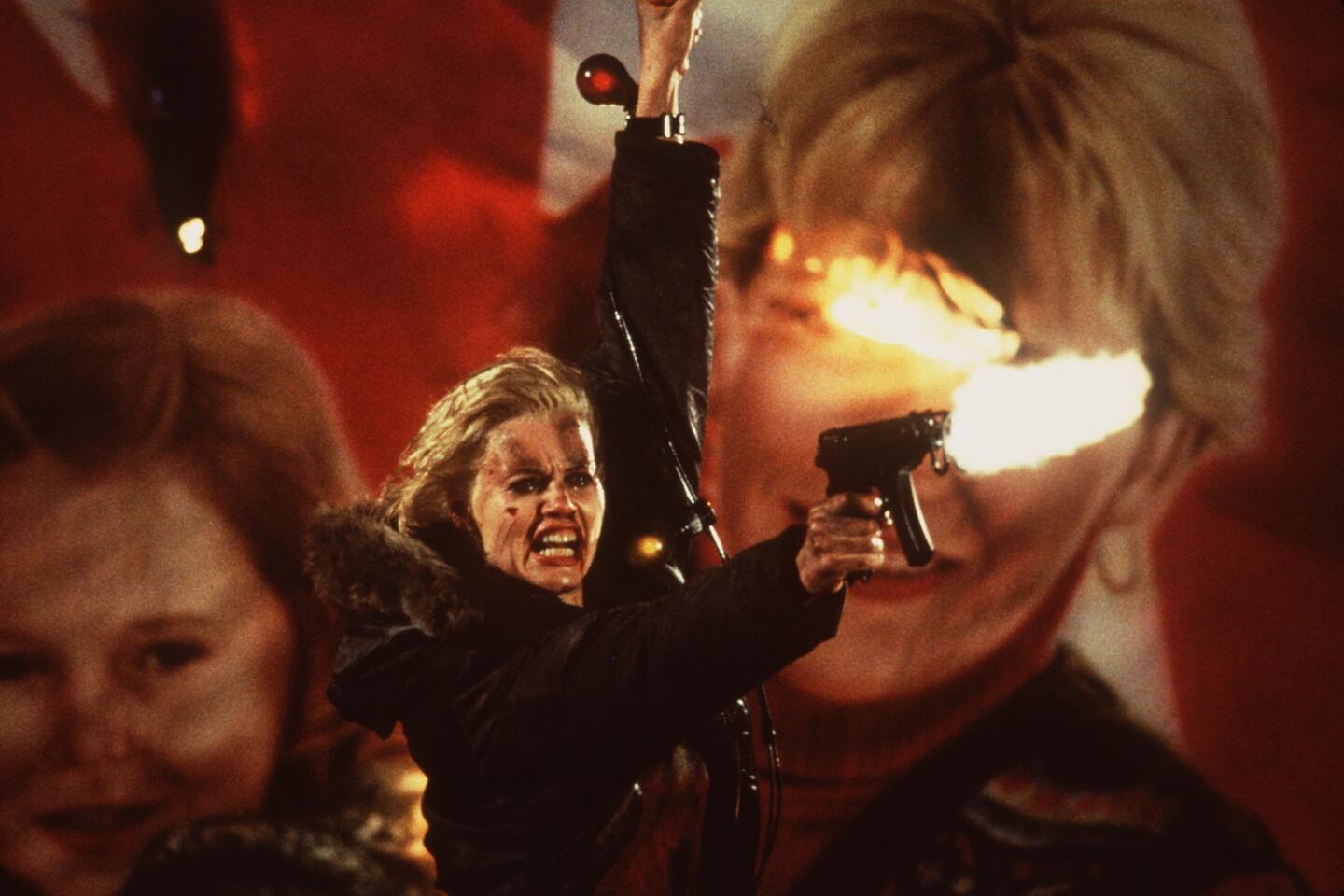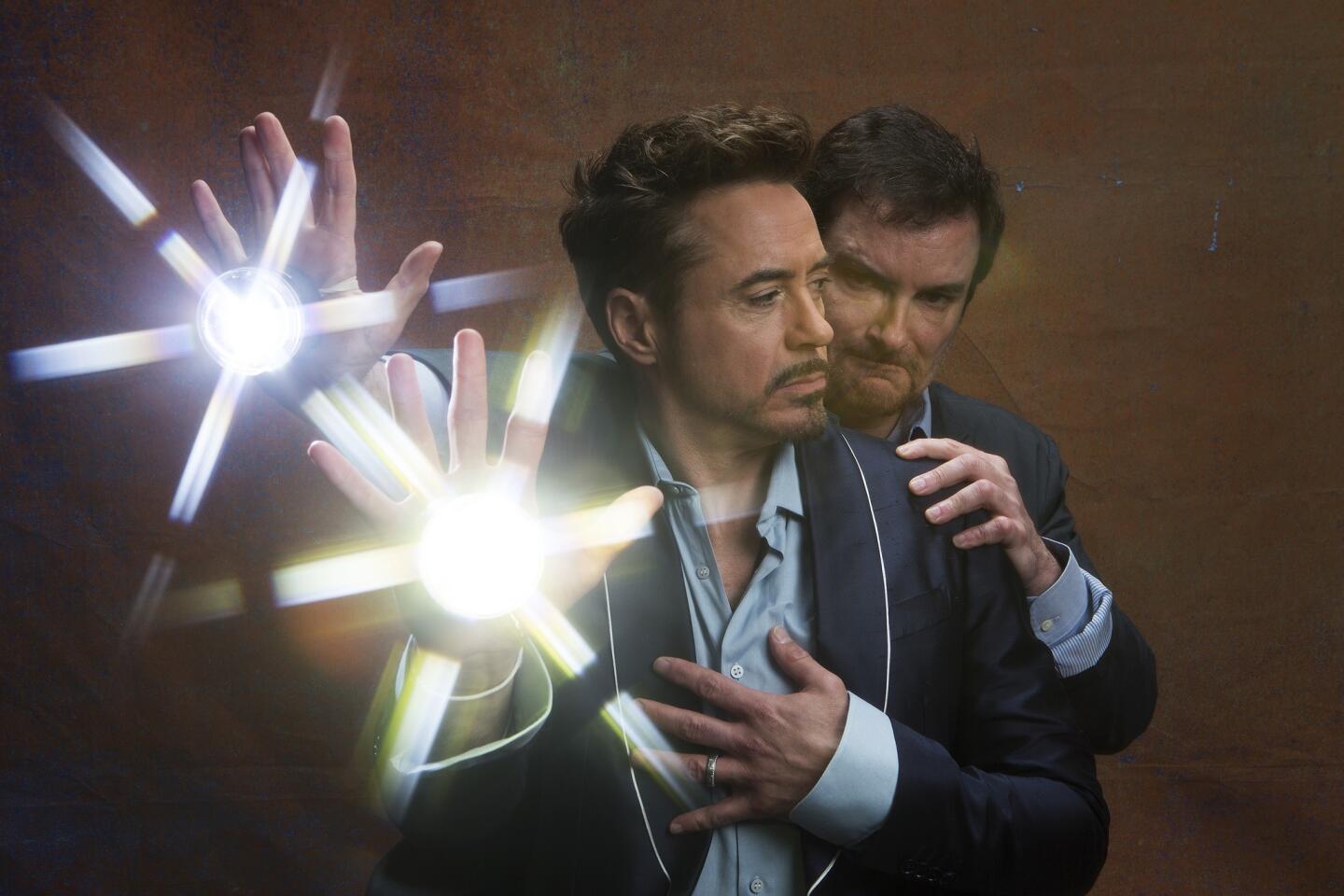The lure of a Southern drawl at the movies
- Share via
“There are things you can get away with in this world, and things you can’t.”
The voice is Matthew McConaughey’s, and days after seeing him in “Mud,” I can close my eyes and hear him still — a simple line echoing with the mysteries of a man caught in the emotional muck and Mississippi mud of Jeff Nichols’ fine new drama.
McConaughey’s voice is like that, so specifically seasoned by Texas you know it sight unseen. That’s the power of a drawl, the way it can wrap entire stories and an ocean of feelings in honeyed tones; the way it can fit a person, a character, like broken-in jeans.
VIDEO: Southern drawls in film
McConaughey, from the Hill Country that hugs Austin, comes by his drawl naturally, but its texture changes with each film he does. It almost disappeared in “The Lincoln Lawyer.” It was thicker and meaner in “Killer Joe”; worried and worn in “We Are Marshall”; sweatier in “Magic Mike”; wasted on “The Wedding Planner,” when he was still in rom-com jail. But it has never been richer than it is in “Mud,” pure gold spun out of love for a girl.
Me, I pay attention to the distinctions when movies try to tap into that homespun magic. I’m fitful when Southern accents are forced, angered when they’re false and hold them close when, like McConaughey’s, they are true.
I’m sure my sensitivity is tied to the melting pot of differing drawls I was raised around in places as well known as Atlanta and Austin, as obscure as Ellenboro and Paw Creek.
My parents were Tarheels, a prideful name for folks with North Carolina roots, and mine are six generations deep. To keep me occupied on summer vacations, my great aunts would send me to pick cotton in the field that stretched out behind the family homestead; fresh-squeezed lemonade and pocket change were my payment for a few hours of wrestling those unforgiving bolls. And when Sally Field picked until her fingers bled in “Places in the Heart,” I recognized the prickly edge that action brought to her enunciation.
PHOTOS: Hollywood Backlot moments
The years have only deepened my affection for the flavor of Southern accents, and their presence in movies can transport me back to other places, other times: Like country ham, redeye gravy and grits at my grandmother’s table next to Uncle SJ when I hear Tommy Lee Jones; a taste of great Aunt Ella’s fried green tomatoes, hot and sweet, in Julia Roberts’ warm tones; the scent of my granddaddy Harlen’s tobacco curing in the barn conjured up by Robert Duvall; hogs being slopped … well, I won’t mention who made me think of that last one. OK, Nicolas Cage in “Con Air.”
While a bad accent makes me cringe, the right inflection deepens and shades the story, and not just for me. It changes the texture of the experience for everyone.
The way a weeping guitar can heighten anguish by clinging to a note, a drawl conveys so much more than mere words ever could. There is an easy wit that sneaks up on you, the humor often carrying an unexpected bite buried inside all that down-home irony, insight and cheek.
Accents, and specifically Southern ones, are an art form, yet sorely overlooked. Alabama is different from Georgia; North Florida distinct from South. Some of the best are from natives, but in “Junebug,” Amy Adams proved that being born in Italy and raised in Colorado didn’t mean she couldn’t bring home North Carolina. Sissy Spacek left every trace of Texas behind for her meticulous Oscar-winning turn as Kentucky’s own Loretta Lynn in “Coal Miner’s Daughter.”
And so, in an attempt to pay my respects, here are some of my favorite Southern movie drawls. Not a ranking but a range. On any given day, the one I love best depends on what place in my heart needs filling.
VIDEO: Southern drawls in film
Jeff Bridges in “Crazy Heart” (2009). Though I did love the stomped flatness of Rooster Cogburn’s pronouncements in “True Grit” — “I can’t do nothing for you son,” a gunshot as punctuation — I’m partial to the whiskey- and cigarette-saturated voice that carried Bad Blake down the road to redemption. Bridges had a way of seasoning the words, then swallowing them up in a gravelly sound that was seductive if not always understandable. And yet you do understand as his voice grows darker when bad times blow through, turns bright when hope beats down like the sun, and always echoes his pain. The way Blake settled into Bridges bones, or vice versa, would win him an Oscar. The voice is what brought it home.
Holly Hunter in “Raising Arizona” (1987). A Georgia girl who never left Georgia behind, Hunter seems to pack words in her cheeks like a wad of bubble gum and chew on things for a while before she spits them out. Her liquor-laced Okie detective in TNT’s “Saving Grace” was exceptional, but nothing matches the full-throttle Hunter in “Raising Arizona.” She rode that accent like she was the Lone Biker of the Apocalypse instead of Tex Cobb. When Hunter’s Ed tells Nicolas Cage’s H.I., “Now don’t you come back here without a toddler, I need me a baby,” never has the need to nurture been funnier or fiercer — or a drawl sharper.
Tommy Lee Jones in “No Country for Old Men” (2007). Though Jones breaks my heart with the Spanish version of his Texas twang in “The Three Burials of Melquiades Estrada,” his weathered lawman in “No Country for Old Men” is so layered it gets my vote. Just the knowing of how horrific humans can be hangs in each syllable as he speculates on the motives of the madman he’s after. Though Jones’ portrayal of another lawman in “The Fugitive,” his accent dialed way down, would win an Oscar, the poignant tenor of “No Country” — with the actor gentling the hard edges of a voice that tends to cut at dialogue like a knife — is Jones at his best.
Amy Adams in “Junebug” (2005). Set in North Carolina, I was prepared to be unforgiving. But the irrepressible country-strong warmth Adams brought Ashley was as irresistible as it was true. And as nonstop. She’s like a wind-up toy that won’t wind down. The hopeful way Ashley says to no one in particular — “I love her” — about her sophisticated new sister-in-law primes you for the way Ashley’s lemon-meringue optimism will ease family tensions. Light, sweet and loving, Adams’ voice lifts spirits like a joyful Southern hymn.
Robert Duvall in “Tender Mercies” (1983). Duvall brings a still-waters-run-deep quality to the spare dialogue of writer Horton Foote’s minimal masterpiece. Traces of hard-baked West Texas give the actor’s reclaimed country singer an emotional depth whether newly sober, newly saved or somewhere in between. The way that drawl travels from spoken word to song is flawless. And when a stranger asks, “Hey, mister, were you really Mac Sledge?” there is a lifetime of irony packed into his, “Yes, ma’am, I guess I was.”
Morgan Freeman in “Driving Miss Daisy” (1989). Most of the time you can’t hear the Tennessee in Freeman’s voice. But as the bemused driver behind the wheel in a racist South, he dug into those roots. It was a fine line he walked, the actor using those warm, buttery tones to voice a weary tolerance for white folk who were not, yet never slipping into subservience. Dignity tempered by affection infused every word and spoke eloquently of the complicated dynamics of Southern race relations in the 1950s.
Woody Harrelson in “Natural Born Killers” (1994). It always sounds like words are having to skinny themselves up to slip through that sideways grin in, say, “Zombieland” or get past the toothpick being worked in “The Messenger.” But the whip and sting of it in “Natural Born Killers” is my favorite. Harrelson’s Mickey is already a stone-cold killer by the time he makes a blood-oath to love and honor his renegade sweetheart Mallory — Juliette Lewis doing a killer drawl herself. But like a sidewinder, snaking around the sound, Harrelson makes Mickey tough yet vulnerable and frightening as hell.
Julia Roberts in “Steel Magnolias” (1989). Most of the time the Georgia in Julia is barely there, which makes “Steel Magnolias” such a syrupy delight. As the Southern belle fighting for “a little bit of wonderful,” Roberts turns the saccharine soulful. As Shelby, that drawl rides currents that are sometimes slow, sometimes swift, always deep. Between the fighting and placating, what you ultimately hear in all those vowels the actress stretches like salt-water taffy is love.
Sally Field and Danny Glover in “Places in the Heart” (1984). It’s Depression-era Texas, and Field’s young widow is trying to hold on to her land. Glover is a drifter with big dreams. There is both silk and steel in their conversations as they stand on opposite sides of the racial divide. Respect comes first, friendship later. By the end, their bond is unbreakable, all those feelings resonating through accents shaded in distinct ways by a complex blend of shared emotions: deference born of need and defiance in its face.
Octavia Spencer and Jessica Chastain in “The Help” (2011). Like spit and fire, Spencer’s and Chastain’s accents played off each other beautifully in that bit of ‘60s-era Southern discomfort. Spencer’s maid is full of sass and resentment until Celia, Chastain in high heels, tight dresses and a mouth to match, comes teetering into her life. Their voices are octaves apart, their rhythms in complete contradiction, and yet the music they made was perfection.
Reese Witherspoon in “Walk the Line” (2005). As June Carter, the Southern spark who would win Johnny Cash’s heart, Witherspoon shifted between over-the-top onstage to slightly bruised off. In an encounter between the ruffles of her dress and Cash’s guitar just as she’s about to go on one night, Witherspoon shows how a drawl can be played for maximum effect. Flirty and winning, she worked that drawl right into an Oscar win.
And McConaughey of course, who started all these random musings, will always linger at the top of my list. Though truth be told none measure up to the sound of my daddy’s voice — like warm molasses on homemade vanilla ice cream — sweeter and richer than all the rest.
More to Read
Only good movies
Get the Indie Focus newsletter, Mark Olsen's weekly guide to the world of cinema.
You may occasionally receive promotional content from the Los Angeles Times.













